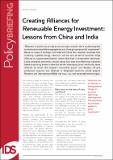| dc.contributor.author | Spratt, Stephen | |
| dc.coverage.spatial | China | en_GB |
| dc.coverage.spatial | India | en_GB |
| dc.date.accessioned | 2014-06-04T14:35:26Z | |
| dc.date.available | 2014-06-04T14:35:26Z | |
| dc.date.issued | 2014-06 | |
| dc.identifier.citation | Spratt, S. (2014) 'Creating Alliances for Renewable Energy Investment: Lessons from China and India', IDS Policy Briefing 67, Brighton: IDS | en_GB |
| dc.identifier.uri | https://opendocs.ids.ac.uk/opendocs/handle/20.500.12413/3964 | |
| dc.description.abstract | ‘Alliances’ of public and private actors can play a crucial role in accelerating the transition to sustainable energy systems, and these groupings can be ‘engineered’. Based on research findings from India and China this research concludes that achieving a global energy transition will be best served if countries forge alliances to support specialisation where they have a comparative advantage. Large emerging economies should create low-cost manufacturing industries based on growing domestic demand; smaller developing countries should create alliances to install the cheapest renewable power and develop off-grid production capacity; and alliances in developed countries should support research and development into new, low-cost renewable technologies. | en_GB |
| dc.description.sponsorship | UK Department for International Development | en_GB |
| dc.language.iso | en | en_GB |
| dc.publisher | IDS | en_GB |
| dc.relation.ispartofseries | IDS Policy Briefing;67 | |
| dc.rights.uri | http://creativecommons.org/licenses/by/3.0/ | en_GB |
| dc.subject | Climate Change | en_GB |
| dc.subject | Environment | en_GB |
| dc.subject | Technology | en_GB |
| dc.subject | Trade | en_GB |
| dc.title | Creating Alliances for Renewable Energy Investment: Lessons from China and India | en_GB |
| dc.type | IDS Policy Briefing | en_GB |
| dc.rights.holder | IDS | en_GB |
| dc.identifier.ag | OT/11009/7/1/1/244 | |


